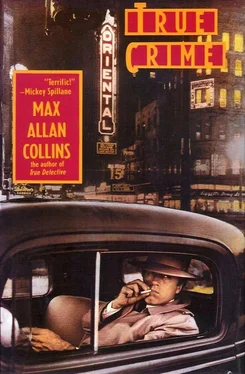“And you knew this man, this cop Dillinger killed.”
“Yes — a fine man, who left a widow and children.”
“So you’d like to get Dillinger.”
“Yes.”
“You want to be in on the kill.”
“You might say that.”
“As opposed to the capture.”
“Heller, do you really think Dillinger could be taken alive?”
“Why not? He’s been caught plenty of times before.”
“But he knows this time he won’t get away; there wouldn’t be any repeat of the Crown Point disaster — no female sheriffs or shoe-polish guns.”
“Maybe you’re right. I don’t know. In any case I don’t think I’m interested.”
“Suit yourself. You’re not planning to talk to Cowley, then? Or Purvis, again?”
“No. But if you want revenge for that East Chicago cop, then Purvis is the man to see. He’ll shoot first and ask questions later, all right.”
Zarkovich stood and put his hat on, smiled wryly, cigarette holder still in his mouth. “I’ve dealt with Purvis before. A very excitable boy. He’s just too young for the job.”
“His ‘men’ are even younger.”
“I know. The boy’s bungled every job he was ever sent on; he should never have been put in charge of things. It’s a good thing... never mind.”
“It’s a good thing the East Chicago police are around this time to help him out?”
“Yes,” Zarkovich smiled. “Exactly.”
I stood behind my desk. “Just out of curiosity, Sergeant — what are you going to do?”
“Try to arrange a deal in Anna Sage’s behalf.”
“What kind of deal?”
“Anna’s got some problems with the immigration people. She thinks maybe these government men could swing things her way, if she helps out with Dillinger.”
“Maybe they could. I take it you won’t be going to the Chicago cops, then.”
“Hell, no! Would you?”
“Stege is a good man.”
“That’s funny, coming from you.”
“Just because he doesn’t like me doesn’t mean I don’t respect him. He’s honest and tough. You’d be much better off with him than Purvis.”
“Thanks for the opinion, Heller. You’re out, then?”
“I’m out.”
“That doesn’t make much sense to me, you know.”
“Just as long as it makes sense to me,” I said.
He shrugged and left. The topic of going back down to have a mutual beer with Barney never came up.
But I went down and joined Barney, who asked me why I was so rude to Zarkovich.
I explained that he was a bagman for East Indiana politicos.
“And he’s got ties to the Capone crowd,” I said. “Not just because the brothels are Syndicate controlled, either. He was up on a federal conspiracy charge about four years ago. He sided with the Capone faction in a gang war that involved some local East Chicago hoods. He got off, ’cause his politico pals clouted him off. But that is one dirty cop, my friend.”
“He seemed okay.”
“He’s slick, and he’s smart. But once he stepped into this picture, an odor turned up. A fishy one.”
“So you’re getting out of this case,” Barney said. “Or is that ‘job’?”
“I don’t know what it is,” I said.
But I didn’t answer the rest of Barney’s question, because I wasn’t sure if I really was out of the Jimmy Lawrence-Polly Hamilton case. Job.
I drove over to Anna Sage’s three-flat and parked down the street and sat on the rider’s side and pretended to read the Trib while I watched. One of the things I was watching for was Zarkovich. I didn’t see him.
Around seven-thirty a Checker pulled up and Jimmy Lawrence, with Anna on one arm and Polly on the other, came out of the three-flat, got in the cab, and headed for the Loop.
I followed them, and guess where they went?
Down to the lakefront, to the fair.
Where they caught Sally Rand’s show at the Streets of Paris.
“That was nice,” Sally Rand said, lighting a cigarette, sitting up in bed with a silk sheet draped across her breasts, “but somehow I don’t think your heart was in it.”
I propped the pillow up behind me and sat up myself. “I thought my heart was in it,” I shrugged.
“That wasn’t your heart, sweets. But I’ll settle.” She stroked the side of my face with the back of a gentle, long-nailed hand; the nails felt cool. The whole world felt cool, up here in her air-conditioned suite atop the Drake. “What’s on your mind, Heller? What’s going on behind those brown eyes?”
“Not much.”
“You want to get some shut-eye? It’s pretty late.” The radium hand of the little round chrome clock on her white nightstand glowed half-heartedly in the near dark. What light there was in the room came in the windows; she had the shades up, curtains back, and the light from Lake Shore Drive and the Gold Coast and winking boats on the lake came in and bathed us like a cool blue breeze.
“Sleep if you like, Helen.”
I was still calling her Helen; at least in bed I was. She seemed to like it. Being called Helen, I mean. And the rest of it, too, I guess.
She stabbed the cigarette out prematurely in a round glass tray on her nightstand. Then turned back to me, leaned on an elbow and smirked. “Most men in this burg would give up one of the family jewels for a night with Sally Rand. And you somehow don’t seem too thrilled.”
“It’s not you. Really.”
“It’s something else.”
“Yeah. Something else. You get some sleep. I’ll just put on my clothes and head back to my place.”
“The hell you will! You’ll spend the night, whether you want to or not, Heller. I’ll be damned if I’ll put up with any hit-and-run driving through this joint.”
I half-smiled at her. “I didn’t mean it like that. I just figured I was lousy company. I’m tickled pink to be sharing a bed with Sally Rand — even if I do happen to know she’s really Helen Beck from Missouri.”
She hit me with a pillow.
Then she flicked on the nightstand lamp. It was a translucent glass tube with a silver base, and the light it gave off glowed; it made her, and the room, look like a soft-focus photograph. She leaned forward, pretty breasts swaying, and kissed me on the mouth for about thirty seconds, then kissed me again, just a smack.
“Let’s get up,” she said, “and I’ll fix you a midnight snack.”
“It’s after midnight.”
“Don’t quibble.”
“I don’t have any pajamas. Will you take offense if I get dressed?”
“Yes. Eat in your underwear. I won’t tell anybody.”
She got up, her body as graceful and supple moving across her bedroom as onstage; she slipped into a white silk kimono, belted it, and waited for me to climb out of bed and follow her. Which I did.
She led me out through the living room, its soft plush carpet soothing my toes. The room was something out of Hollywood, running to modern, rounded furniture — sofa, divan, chairs, all soft-looking and covered in a sort of sun-bleached gunnysack. Everything was white (except for occasional blond wood) right down to the marble fireplace over which hung an airbrushed painting of orchids. On her way to the kitchen, she stopped to turn on a lamp on the blond end table by the sofa, a lamp that looked like her: a silver nude holding a round piece of frosted glass, like a flat bubble, behind which a pale little light gave off a minimal glow.
Earlier, before tumbling into bed, we’d sat in this living room, having martinis — a drink I hate, but when Sally Rand offers you martinis in her white art-deco suite before going off to bed with you, you can afford to suffer a little — and leafing through her big scrapbook of show biz clippings and such. There were stills of her in a silent called Paris at Midnight (she was wearing her natural light brown hair publicly in 1926) and another called Golf Widows (but by ’28 was blond); and some on-the-set shots with De Mille, as well as some publicity photos from her Orpheum circuit act, “Sally and Her Boys.” Then the huge front-page spread of her Lady Godvia entrance at the Fine Arts Ball, and the many court appearances her nude dancing earned her (she was given a year in jail, but won an appeal before serving a day) and several pamphlets complaining about her act circulated by “anti-indecency leagues” (anti-indeceny being a lot like pro-decency, I would imagine) and a few stills from the movie she’d made not long ago, with George Raft. I mentioned to her that I knew Raft, and she said, “Small world,” and left it at that. Never name-drop with celebrities.
Читать дальше












